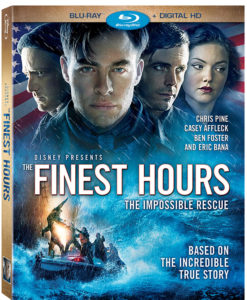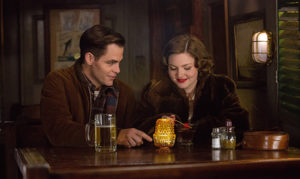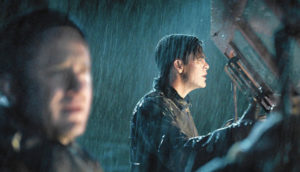
When it comes to “historical United States Armed Forces films” typically people do not think of the Coast Guard at first– or at all. This is disappointing considering the scope and frequency of where and when the Coast Guard operates. Sure, we don’t have a lot of films about an elite and trained group of Coast Guard soldiers infiltrating a compound in some difficult-to-pronounce country to rescue fellow Americans, but, that does not mean that their bravery or sacrifice is any less important. In fact, like the other branches of the Armed Forces, the most routine of missions can turn dangerous and when things are at their worst, they pose some of the most impossible odds of anything humans could hope to overcome. It is with that understanding (and with Memorial Day rounding the corner) that it seems appropriate to take a look at a film that honors one of the greatest rescues in Coast Guard history.
Bernie Webber: “They say you gotta go out. They don’t say you gotta come back…”
This was the charge of our focal character, Captain Bernie Webber (Chris Pine), in 1952, as a massive winter storm struck off the coast of Cape Cod sinking two massive oil tankers. With the first tanker going down and most of the resources from all surrounding stations diverted to it, there were only a handful of men and boats left when it was discovered that the second T-2 tanker, the Pendleton, was split in half and its surviving crew of more than 30 was not long for this world. Despite the odds stacked against them, Webber and a small, hesitant crew set out in a 12-seat boat to brave the freezing cold, 60-foot waves, and hurricane-force winds in an attempt to pull off what would be the greatest small-boat rescue in Coast Guard history.
 Even though we know the history, when our film opens, you wouldn’t think that weather and oceans were the things Bernie Webber had to fear the most. We see him and a friend waiting to meet Miriam, the woman who he would eventually marry, at a diner in a snowstorm. Bernie and Miriam’s relationship was definitely odd– especially for the 1950s. There is some mystery as to why the film opens up with this relationship as one of the only non-factual events in the film is Miriam’s involvement. This sets a confusing tone for the film and distracts from what this movie should really be about (in a similar way to when Michael Bay’s Pearl Harbor gets distracted by a confusing love story instead of focusing on the themes of selflessness, honor, and sacrifice already built into the historical narrative).
Even though we know the history, when our film opens, you wouldn’t think that weather and oceans were the things Bernie Webber had to fear the most. We see him and a friend waiting to meet Miriam, the woman who he would eventually marry, at a diner in a snowstorm. Bernie and Miriam’s relationship was definitely odd– especially for the 1950s. There is some mystery as to why the film opens up with this relationship as one of the only non-factual events in the film is Miriam’s involvement. This sets a confusing tone for the film and distracts from what this movie should really be about (in a similar way to when Michael Bay’s Pearl Harbor gets distracted by a confusing love story instead of focusing on the themes of selflessness, honor, and sacrifice already built into the historical narrative).
The film often references a previous disappointment in Webber’s career of not being able to reach and save the crew of the William J Landry. It is depicted as an opportunity that has not only haunted Webber, but has motivated him to redouble his efforts, even in more grim circumstances. I think the connection we could have had to Webber’s obvious sense of duty could have been solidified if we could have been with him on an ultimately futile journey to save the crew of the Landry. This would have given more gravitas to the rallying cry of “We all live, or we all die.” It’s the kind of phrase you could hear in any number of military movies, usually sparked from a sense of duty, honor, or brotherhood. In this case, I worry that guilt is the motivating factor (as depicted in the film). It is always a careful line we have to walk between guilt and grief. As Paul reminds us in 2 Corinthians, there is a positive side to grieving things though grieving in a “worldly way” leads to death. Is the failure to rescue the Landry something that has consumed Webber in a way that it clouds his good judgement in the future or has it established his resolve to lay down his life for others if the need arises.
 It is hard to argue with the results this time– and we can always hope that Webber’s resolve came from renewed resolve and not a place of guilt or shame for past failures. We have all lived there at some point– even if the failure was inevitable or unavoidable. It is times like that when we can really lean into our identity in Christ. We no longer have to define ourselves by our failures (or our worldly success) because we can define ourselves by something bigger– something better. Walking in the knowledge that we are a chosen and loved people, we can wake up each day with a resolve to love our neighbor as ourselves and being willing to sacrificially lay our lives down (metaphorically and physically) without fear. This is the kind of thing that I often reflect about on Memorial Day. I remember, not only, those folks who have sacrificed themselves for our freedoms, but of the One who sacrificed His only Son so all humanity could live out a new identity– an identity without borders or agenda– an identity as Sons and Daughters of God.
It is hard to argue with the results this time– and we can always hope that Webber’s resolve came from renewed resolve and not a place of guilt or shame for past failures. We have all lived there at some point– even if the failure was inevitable or unavoidable. It is times like that when we can really lean into our identity in Christ. We no longer have to define ourselves by our failures (or our worldly success) because we can define ourselves by something bigger– something better. Walking in the knowledge that we are a chosen and loved people, we can wake up each day with a resolve to love our neighbor as ourselves and being willing to sacrificially lay our lives down (metaphorically and physically) without fear. This is the kind of thing that I often reflect about on Memorial Day. I remember, not only, those folks who have sacrificed themselves for our freedoms, but of the One who sacrificed His only Son so all humanity could live out a new identity– an identity without borders or agenda– an identity as Sons and Daughters of God.
Ultimately, as a film, The Finest Hours does speak to the courage and sacrifice that is inherent in Coast Guard service which I am sure was a main gaol. We even can see this film as a triumph of the human spirit in some ways. And though this film is, at times, very visually impressive (it spent almost a year in post-production due to its nearly 1000 effects shots), the narrative itself is more concerned with showing the audience the immensity and power of weather and confusing its story with a partial love story than solidifying itself in more ways than simply recounting a few historical actions and dramatizing a couple scenes with townsfolk. Despite this disappointment, the film is worth consideration as a tale that shows, even if unhealthily motivated, what people can achieve when willing to put their needs and safety behind that of their fellow man.
*The Finest Hours will be available on Blu-Ray, Digital HD and Disney Movies Anywhere (DMA) on Tuesday, May 24, 2016.


